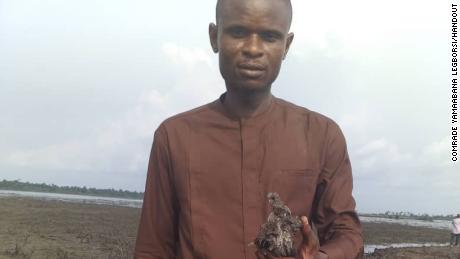Inquiry into oil spills in Nigeria launched

"This Commission will investigate the human and environmental impact of multinational oil company activity and is crucial to the prosperous future of the people of Bayelsa and their environment, Nigeria and hopefully to other oil-producing nations," he said. Nigeria is Africa's largest oil producer. The country's crude oil production — estimated at over 300 million liters per day — makes up 70 percent of the Nigerian government's revenue.This new commission, convened by Bayelsa Governor Seriake Dickson, says that it wants to make oil companies in the region more accountable."The world has looked on for too long without taking the necessary collective action to put a stop to the damage being done by oil companies in Bayelsa. We must put the environment and the health and wellbeing of our communities first," Dickson said in a statement Wednesday. Big oil spills are common in the Niger Delta where over 40 million liters of crude oil is spilled annually, resulting in human deaths and damage to the local ecosystem. A 2018 study by the Journal of Health and Pollution found that more than 12,000 oil spill incidents have occurred in the oil-rich region between 1976 and 2014.Pipeline corrosion and tanker accidents caused more than 50 percent of them. Other incidents can be attributed to operational error, mechanical failure, and sabotage mostly from militant groups, the study said.
Contaminated lands, water
The Niger Delta is a diverse region with rich mangroves and fish-rich waterways. Many residents try to make their livelihoods from fishing and farming.Yamaabana Legborsi lives in Gokana in Ogoni, the most affected community, where residents have stopped oil companies from pumping oil from their lands.The 32-year-old told CNN growing up the community posed both mental and economic challenges to him as a child. "We could not play in the sand like other children else you are covered in black crude. My mother was especially worried it was not safe, so were other parents. "We could not also eat the fishes that washed away from the river, you would see crude all around the water," Legborsi said. The situation has not changed, Legborsi says, despite promises from oil companies clean things up. "I cannot drink water from my borehole. You can perceive crude oil and kerosene. Many of the residents here drink well water, that is contaminated too," he added.Experts from the United Nations Environment Programme, (UNEP) in the first scientific survey of the area found that people in Ogoniland had "lived with chronic oil pollution throughout their lives." UNEP researchers in the 2011 report said it would take 30 years to clean the oil mess left behind. Oil companies expected to clean up spills within 2Read More – Source
The situation has not changed, Legborsi says, despite promises from oil companies clean things up. "I cannot drink water from my borehole. You can perceive crude oil and kerosene. Many of the residents here drink well water, that is contaminated too," he added.Experts from the United Nations Environment Programme, (UNEP) in the first scientific survey of the area found that people in Ogoniland had "lived with chronic oil pollution throughout their lives." UNEP researchers in the 2011 report said it would take 30 years to clean the oil mess left behind. Oil companies expected to clean up spills within 2Read More – Source
[contf] [contfnew] 
CNN
[contfnewc] [contfnewc]



